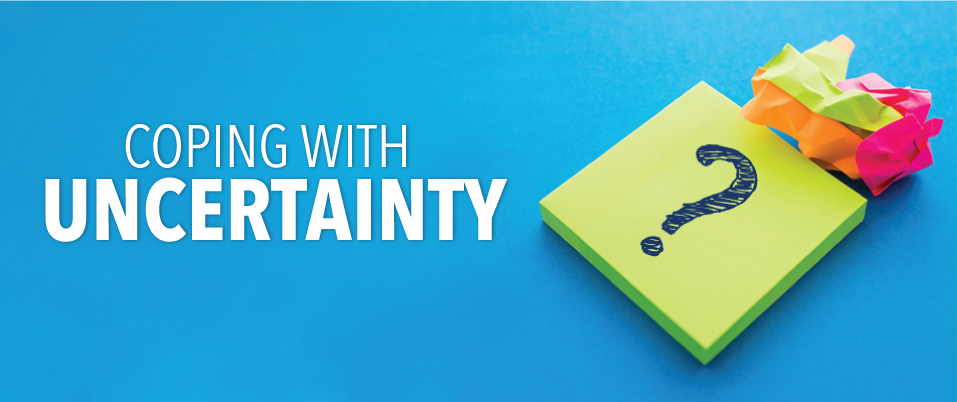
Coping with Uncertainty
Life can feel very uncertain these days. Young adults may feel worried about what their fall college semesters will look like, if they will be able to find a job, and if they will be able to hang out with their friends or go on a date. Feelings of fear and worry can leave young people feeling anxious and overwhelmed.
In times like these, it is good to remember that no matter how helpless or hopeless you are feeling, there are steps you can take to cope with the uncertainty of life. Here are some strategies that may help give you a sense of control and make you feel a bit more safe:
1. BREATHE
When people are anxious they tend to take rapid, shallow breaths that come directly from their chests. This type of breathing is called thoracic or chest breathing. When you’re feeling anxious, you may not even be aware you’re breathing this way but this can cause your heart to race and for you to feel dizzy. This can make you feel even more anxious and even make you feel like you are having a panic attack.
Try this simple breathing technique to help you relax:
- Inhale slowly and deeply through your nose.
- Exhale slowly through your mouth
- Repeat for several minutes until you start to feel better.
Some people like to use a visual when they are doing their deep breathing. Try this one: pretend you are holding a beautiful red rose in your left hand and a pretty birthday candle in your right hand. Then inhale slowly and visualize yourself smelling the lovely fragrance of the gorgeous rose. Then exhale and slowly blow out your birthday candle. If you find that watching a video is helpful while you practice deep breathing, you can find videos like this calming breath bubble on youtube.
The best thing about using your breathing to help you to feel better is that no one has to know! You can do it standing up, waiting in line, or sitting down. The more you practice, the more natural it starts to feel.
2. EXERCISE
Physical activity improves your body’s ability to use oxygen and improves blood flow which directly affects your brain by increasing your brain’s production of endorphins. Endorphins are the “feel-good” neurotransmitters that give you a sense of well-being after exercise.
Physical activity like going for a walk or a bike ride can also help take your mind off your worries. Invite a friend to join you when you exercise and make an effort to ask them how they are doing. Helping someone else is a great way to boost your own mood!
3. ACCEPT THAT LIFE MAY ALWAYS HAVE SOME FORM OF STRESS AND LEARN COPING SKILLS LIKE PRACTICING SELF-CARE
No matter how much we may try to feel in control, the truth is that life just comes with uncertainty. Recognize the signs that you are feeling overwhelmed. Some people experience stress as physical pain such as a headache or stomach ache. Others may feel like they can’t catch their breath or that they just don’t want to get out of bed in the morning. When you realize you are feeling really anxious, try practicing self-care.
Great self-care strategies are relaxation techniques such as yoga or meditation. There are quite a few online yoga classes available for you to try as well as a number of meditation apps. Challenge yourself to set aside some time each day to practice these new skills.
Establish good sleep hygiene. Taking the time to relax and unwind before bed can help you to sleep better at night.
Eat a healthy diet. Eating healthy meals can help maintain your energy levels and prevent mood swings. Avoid sugary and processed foods to give your overall mood a boost.
4. TAKE ACTION OVER THE THINGS YOU CAN CONTROL
So much of life right now feels uncertain and there are many things beyond your control. But it may help to remind yourself that you are not powerless.
For example, if you are worried about your health during this pandemic, you can take action by wearing a mask when you leave the house, frequently washing your hands, and avoiding crowded places. If you lost your job through no fault of your own, you can control how much energy you spend on a job search by updating your resume and practicing your job interviewing skills.
By focusing on what is in your control, you will worry less and use your active problem solving skills more. And it is ok to ask for help, in fact it takes strength to ask for help! Life Skills Coaches, teachers, and trusted friends can assist you with creating more certainty in your life. You can do it!
Jeri Rochman, JD, MS
Jeri Rochman, JD, MS, is the Advance LA Director of Community Outreach, a Life Skills Coach, National Board Certified Counselor and Certified Parent Educator. Interested in learning more about Advance LA’s services?